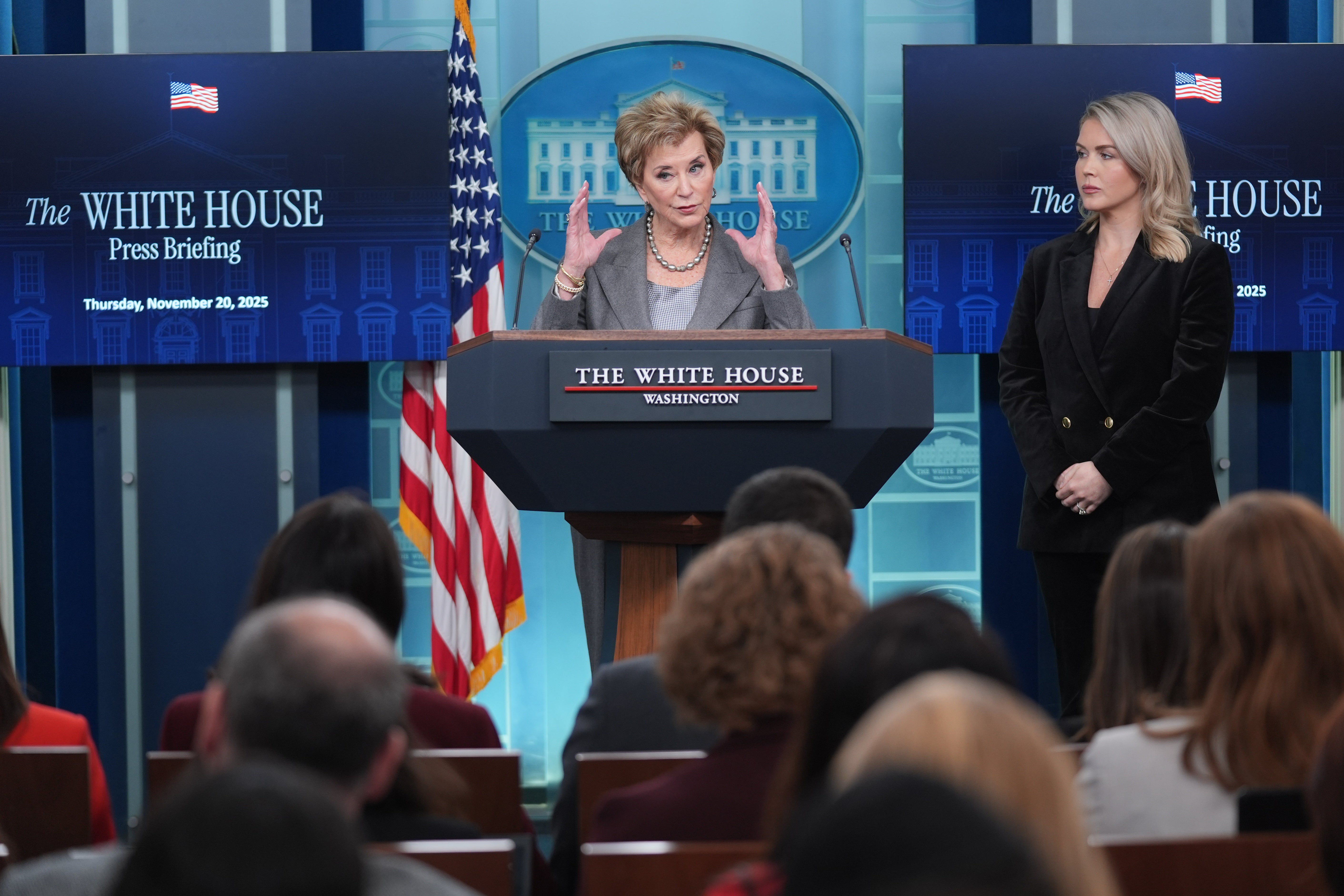- News
- World
- Americas
- US politics
Schools will continue to receive federal funding without interruption, Education Secretary Linda McMahon said
Collin BinkleyFriday 21 November 2025 16:35 GMT
Sign up for the daily Inside Washington email for exclusive US coverage and analysis sent to your inbox
Get our free Inside Washington email
Get our free Inside Washington email
 Email*SIGN UP
Email*SIGN UPI would like to be emailed about offers, events and updates from The Independent. Read our Privacy notice
The Trump administration’s controversial plan to dismantle the Education Department has been met with a chorus of criticism from state officials, who warn it will create more bureaucracy rather than less, offering no clear benefit for students struggling with core subjects. The administration argues the move is a solution to the nation’s lagging academic performance, aiming to free schools from federal influence.
Under the proposed overhaul, much of the Education Department’s work would be dispersed across four other federal departments. For President Donald Trump, this represents a step towards fully closing the department and granting states greater autonomy over schooling. However, many states contend that this fragmentation will complicate their role as intermediaries between local schools and the federal government.
Washington state’s education chief warned the plan would increase bureaucracy fivefold, "undoubtedly creating confusion and duplicity" for educators and families. His Californian counterpart described it as "clearly less efficient" and a source of disruption, while Maryland’s superintendent raised concerns about "the challenges of coordinating efforts with multiple federal agencies."
"States were not engaged in this process, and this is not what we have asked for — or what our students need," stated Jill Underly, Wisconsin’s state superintendent, who urged the administration to offer states greater flexibility and reduce standardised testing requirements.
Education Secretary Linda McMahon maintained that schools would continue to receive federal funding without interruption. She suggested that, ultimately, schools would gain more money and flexibility to serve students without the Education Department’s existence.
 Education Secretary Linda McMahon speaking at the White House (Copyright 2025 The Associated Press. All rights reserved)
Education Secretary Linda McMahon speaking at the White House (Copyright 2025 The Associated Press. All rights reserved)However, the department remains in place, as only Congress possesses the authority to abolish it. In the interim, Ms McMahon’s plan leaves the agency in a state of federal limbo. The Labour Department is set to assume responsibility for most funding and support for the country’s schools, though the Education Department will retain certain duties, including policy guidance and broad supervision of Labour’s education work.
Similar arrangements will see programmes offloaded to the Department of Health and Human Services, the State Department, and the Interior Department. These agreements were signed just days before the government shutdown and announced on Tuesday. While inter-departmental work-sharing agreements are not new – the Education Department had dozens before Mr Trump took office, and local schools routinely collaborate with agencies like the US Agriculture Department on school meals – the current proposal’s scale is unprecedented, involving the majority of the Education Department’s funding for schools.
Despite widespread apprehension, Virginia schools chief Emily Anne Gullickson welcomed the administration’s efforts to grant states more control, noting that schools are accustomed to working with multiple federal agencies.
Response to the plan has largely followed political lines, with Democrats asserting that the shake-up will harm America’s most vulnerable students. Republicans in Congress, conversely, hailed it as a victory over bureaucracy. Yet, some conservatives have voiced opposition. US Senator Lisa Murkowski, an Alaska Republican, expressed concerns on social media that moving programmes to agencies lacking policy expertise could negatively impact young people. Margaret Spellings, who served as education secretary under Republican President George W. Bush, dismissed the plan as a distraction from a national education crisis.
"Moving programmes from one department to another does not actually eliminate the federal bureaucracy, and it may make the system harder for students, teachers and families to navigate and get the support they need," Ms Spellings said in a statement.
There is little disagreement regarding the necessity for change within America’s schooling system. Maths and reading scores have plummeted in the wake of COVID-19, following decades of stagnant reading scores and only marginally better maths results. Ms McMahon cited this as evidence of the Education Department’s failure and redundancy. At a White House briefing on Thursday, she characterised her plan as a "hard reset" that maintains federal support while ending "federal micromanagement."
Randi Weingarten, president of the American Federation of Teachers union and a prominent critic of Ms McMahon, questioned the logic behind the plan. "Why would you put a new infrastructure together, a new bureaucracy that nobody knows anything about, and take the old bureaucracy and destroy it, instead of making the old bureaucracy more efficient?" Ms Weingarten asked at a Wednesday event.
The full ramifications of the shake-up may not become clear for months, but it is already generating anxiety among states and school districts that have come to rely on the Education Department for its policy expertise. One of the agency’s crucial roles is to serve as a resource for questions concerning complex funding formulas and special education laws.
The department has not confirmed whether officials performing this role will retain their positions during the transition. Without such assistance, schools would have limited options for clarifying what can and cannot be funded with federal money, according to David Law, superintendent of Minnetonka Public Schools in Minnesota and president of AASA, a national association of school superintendents. "What could happen is services are not provided because you don’t have an answer," Mr Law warned.
Concerns have also been raised about the capacity of other federal departments to absorb an influx of new responsibilities. The Labour Department, for instance, is set to take over Title I, an £18 billion grant programme serving 26 million students in low-income areas. This programme will be managed by a Labour office that currently handles grants for only 130,000 people annually, noted Angela Hanks, who led the Labour office under President Joe Biden. At best, Ms Hanks predicted, this move would "unleash chaos on school districts, and ultimately, on our kids."
In Salem, Massachusetts, Superintendent Stephen Zrike oversees a 4,000-student school system that receives approximately £6 million in federal funding, supporting services for low-income, homeless, or English language learning students. He fears that transferring these programmes to the Labour Department could introduce new "rules of engagement." "We don’t know what other stipulations will be attached to the funding," he said, adding, "The level of uncertainty is enormous."
Critics have also highlighted the irony that the Education Department was originally established to consolidate education programmes previously scattered across multiple agencies. Representative Bobby Scott, a Democrat from Virginia and ranking member on the House Education and Workforce Committee, urged Ms McMahon to reconsider her plan, citing the 1979 law that created the department, which noted that dispersion had resulted in "fragmented, duplicative, and often inconsistent Federal policies relating to education."


